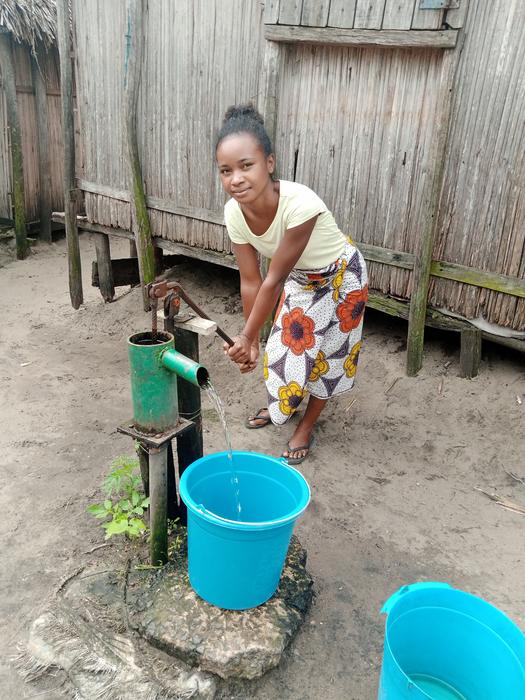TAMPA, Fla. (Nov. 16, 2023) — A team of engineers and public health experts from the University of South Florida is helping Toamasina, Madagascar, residents reduce their exposure to lead – a major global environmental pollutant that causes more than 1 million premature deaths each year. By combining efforts to replace water pumps and educate city technicians, USF researchers helped decrease the blood lead levels of 87 percent of the children tested during their study.

Credit: University of South Florida
TAMPA, Fla. (Nov. 16, 2023) — A team of engineers and public health experts from the University of South Florida is helping Toamasina, Madagascar, residents reduce their exposure to lead – a major global environmental pollutant that causes more than 1 million premature deaths each year. By combining efforts to replace water pumps and educate city technicians, USF researchers helped decrease the blood lead levels of 87 percent of the children tested during their study.
“They were taking old car batteries and melting them down to make check valves in the pumps,” said James Mihelcic, professor and director of USF’s International Development Engineering Program.
Mihelcic made the discovery when visiting the East African country with students to study Toamasina’s water and sanitation. “We brought back water samples to USF to test them and we learned the locally manufactured pumps had really high levels of lead.”
The lead concentrations of the water from the pumps exceeded the World Health Organization’s recommended limit of lead in drinking water – 10 micrograms per liter. In some cases, the water contained more than 10 times the recommended limit.
“The families and children are drinking this water and using it to cook their meals,” said principal author Adaline Buerck, a USF civil and environmental engineering doctoral alumna. “In low- and middle-income countries, there is a lack of regulations and understandings of the harmful effects of lead, as well as other comorbidities, such as improper nutrition, that can increase childhood lead absorption.”
The pumps are the primary source of water for more than three-quarters of the coastal area of Madagascar, where there are about 9,000 pumps because tap water is not always affordable or available for the city’s 280,000 people. After receiving a small grant to replace lead components in 500 of the pumps, Mihelcic and Buerck knew it would be a challenge to remediate all of the remaining pumps. They decided to collaborate with Mahmooda Khaliq Pasha, USF associate professor of public health and social marketing.
Khaliq Pasha used social marketing – a process that focuses on changing behavior to improve health using strategies from the commercial marketing world – to create a faster, more cost-effective plan to directly educate the people responsible for the manufacturing and repairing of the pumps.
“We knew we couldn’t replace all of the pumps, so we provided training to the technicians about the dangers of lead and why they could have an improved product if they make a lead-free pump,” Khaliq Pasha said. “Now, when they manufacture a new pump or repair existing ones, they will use these new strategies, and with that, we’re impacting the larger population rather than just the small sample that we work with.”
Khaliq Pasha and Buerck worked with local staff to build the capacity and skill set of technicians, while overseeing and facilitating work on the pumps to ensure they understood how to remove and replace the leaded pump components. Additionally, to understand the impact of this intervention, they worked with local health practitioners to measure blood lead levels of small children who drank water from the pumps before and after the leaded pump components were replaced.
Of the 55 children tested, 87 percent experienced a significant decrease in blood lead levels once leaded components were removed from the pumps. For example, one child had an initial 11.3 micrograms of lead per liter of blood. Following the intervention, that level dropped to 4.7 micrograms per liter. The team believes these findings point to a need for greater consideration of lead in drinking and cooking water as an important exposure route in low- and middle-income countries.
“This study really puts into perspective the social aspects of public health,” Buerck said. “For me, it really linked engineering to the real world and the impact you can have.”
Through a National Science Foundation grant, USF students are working with Khaliq Pasha, Mihelcic and USF Associate Professor Jeff Cunningham to continue visiting Madagascar. They will work with families to further purify their water by removing disease-causing pathogens. Khaliq Pasha and Mihelcic hope to secure additional funding to continue working with the technicians and scale the work to impact the larger population.
Journal
Environmental Science & Technology
Method of Research
Experimental study
Subject of Research
People
Article Title
Reductions in Children’s Blood Lead Levels from a Drinking-Water Intervention in Madagascar, Sub-Saharan Africa
Article Publication Date
18-Oct-2023




